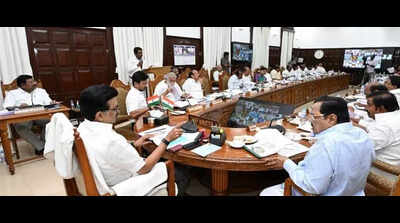Politics
Tamil Nadu Government Unveils New Welfare Initiatives for Sanitary Workers

The Tamil Nadu government has announced a series of welfare measures aimed at supporting sanitary workers following a significant protest against privatization. Chief Minister M K Stalin chaired a cabinet meeting on Thursday, where the new initiatives were approved in response to a 13-day demonstration by workers advocating for their rights and better working conditions.
In a statement made on social media after the meeting, Stalin emphasized that the Dravida Munnetra Kazhagam (DMK) party will not abandon sanitary workers. This commitment comes amid criticism of the government’s handling of the protests, which included the midnight arrests of demonstrators.
New Initiatives for Sanitary Workers
During the meeting, Finance Minister Thangam Thennarasu outlined six key initiatives designed to enhance the welfare of sanitary workers. Notably, the government will provide life insurance coverage of 5 lakh INR, which, combined with existing monetary aid from the sanitary workers welfare board, totals approximately 10 lakh INR per family.
Additionally, the government plans to offer a subsidy of 35% (up to 3.5 lakh INR) for family members of sanitary workers who choose to start their own businesses. To further support these initiatives, an annual budget of 10 crore INR has been allocated for this purpose. A 6% interest subsidy will also be available for timely loan repayments.
The state government is set to launch a scholarship scheme to cover tuition, hostel, and book fees for the children of sanitary workers. This initiative aims to provide educational opportunities and reduce financial burdens on families.
Health and Housing Improvements
In an effort to address health concerns, the Tamil Nadu government will introduce a scheme for the diagnosis and treatment of lung and skin diseases among sanitary workers. This measure aims to protect the health of those who often work in challenging conditions.
Housing is another critical focus, with plans to construct 30,000 new housing units for urban sanitary workers within the next three years. For rural workers, housing will be prioritized under the existing Kalaignar Kanavu Illam scheme, ensuring better living conditions for these essential workers.
To ensure food security, the government will implement a free breakfast program for workers in urban local bodies, starting with the Greater Chennai Corporation and expanding statewide. This initiative is designed to support those who begin their shifts early in the morning.
Stalin reiterated the government’s commitment to the welfare of sanitary workers, who perform vital services in all weather conditions. He noted that over the past four years, multiple welfare schemes have been initiated to benefit this workforce, and he assured that the government would continue to consider their legitimate demands.
This comprehensive approach reflects the Tamil Nadu government’s recognition of the contributions of sanitary workers and its commitment to improving their quality of life. As these initiatives roll out, they will aim to provide not only immediate support but also long-term benefits for the families of those who serve in these essential roles.
-

 World5 months ago
World5 months agoSBI Announces QIP Floor Price at ₹811.05 Per Share
-

 Lifestyle5 months ago
Lifestyle5 months agoCept Unveils ₹3.1 Crore Urban Mobility Plan for Sustainable Growth
-

 Science4 months ago
Science4 months agoNew Blood Group Discovered in South Indian Woman at Rotary Centre
-

 World5 months ago
World5 months agoTorrential Rains Cause Flash Flooding in New York and New Jersey
-

 Top Stories5 months ago
Top Stories5 months agoKonkani Cultural Organisation to Host Pearl Jubilee in Abu Dhabi
-

 Sports4 months ago
Sports4 months agoBroad Advocates for Bowling Change Ahead of Final Test Against India
-

 Science5 months ago
Science5 months agoNothing Headphone 1 Review: A Bold Contender in Audio Design
-

 Top Stories5 months ago
Top Stories5 months agoAir India Crash Investigation Highlights Boeing Fuel Switch Concerns
-

 Business5 months ago
Business5 months agoIndian Stock Market Rebounds: Sensex and Nifty Rise After Four-Day Decline
-

 Sports4 months ago
Sports4 months agoCristian Totti Retires at 19: Pressure of Fame Takes Toll
-

 Politics5 months ago
Politics5 months agoAbandoned Doberman Finds New Home After Journey to Prague
-

 Top Stories5 months ago
Top Stories5 months agoPatna Bank Manager Abhishek Varun Found Dead in Well









